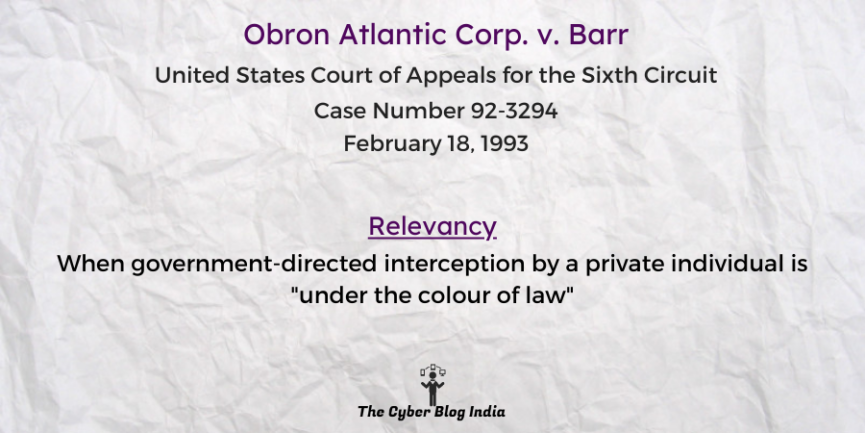Obron Atlantic Corp. v. Barr

Obron Atlantic Corp. v. Barr
990 F.2d 861
In the United States Court of Appeals for the Sixth Circuit
Case Number 92-3294
Before Circuit Judge Guy, Circuit Judge Ryan and Senior District Judge Churchill
Decided on February 18, 1993
Relevancy of the case: When government-directed interception by a private individual is “under the colour of law”
Statutes and Provisions Involved
- The Federal Wiretapping Act, 18 USC §§ 2510-2521
Relevant Facts of the Case
- Owen was the highest-ranking Obron Atlantic official and only reported to President Eckart. On March 22, 1987, Owen recorded a conversation where an Obron director said that Eckart wanted to fire him.
- The next day, Owen called the Department of Justice Antitrust Division, informing them of various antitrust violations in the powdered metals industry.
- At the meeting, DOJ attorneys asked Owen whether he would record the conversations between him and others from the industry. Owen agreed and recorded conversations with other high-ranking Obron officials, rivals, customers and outside accountants.
- Owen continued recording but could not consensually record conversations unless approved by authorities. Once satisfied that he followed instructions, the federal attorneys said there was no need to give Owen prior authorisation for every call.
- In 1991, Obron requested a preliminary and permanent injunction against using the tapes and any derivative evidence, but the District Court refused.
Prominent Arguments by the Counsels
- The plaintiff’s counsel argued that the tapes were not made ‘under colour of law’ to exempt them from being categorised as intercepted communication but resulted from Owen’s grudge against Obron. Additionally, Owen broke government rules by failing to record every discussion, regardless of its taping.
- The defendant’s counsel submitted that the DOJ and Owen contacted each other several times a week.
Opinion of the Bench
- The continuous yet irregular contact between the DOJ and Owen outweighs the absence of official oversight of the recording process and Owen’s inability to follow critical directions.
Final Decision
- The court affirmed the District Court’s judgement.
Risha Thomre Rajani, an undergraduate student at NMIMS Kirit P. Mehta School of Law, Mumbai, prepared this case summary during her internship with The Cyber Blog India in May/June 2023.
